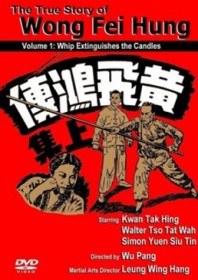
The long-running series of black and white Wong Fei-hung films starts here; perhaps the first traditional kung fu movies in terms of genuine martial arts study and focus, in contrast to the fantasy-led, swashbuckling wuxia films of Shanghai’s silent era.
The film immediately assumes the notion of sifu Wong as an established Foshan legend, a folk hero known as a good and virtuous man who defends the poor, heals the weak and highlights social injustice. Prone to philosophical bouts of Confucian morality, he advocates diplomacy and only ever shows his skills as a great kung fu master when provoked; a practitioner of the Hung Kuen Shaolin kung fu system bestowed upon him from his late and equally respected father, Wong Kei-ying. He is the voice of the common man with close ties to the local constabulary and other authority figures, and he is always at the mercy of hotheaded and unruly students. This phenomenally successful film series ran into the 1960s and included over 70 titles, many of which were directed by Wu Pang and starred Beijing Opera performer Kwan Tak-hing as the eponymous hero.
As to how much these tropes relate to the real Wong Fei-hung is open to conjecture, although it is true that many who initially worked on the film series had links to the real Wong Fei-hung, who had passed away over two decades before in 1924. Indeed, the film series was endorsed by Wong Fei-hung’s son and widow, who both acted as consultants. Whether a single man could ever possess such Messianic qualities seems something of a moot point. The sifu Wong depicted here is obviously a composite character representing a distinctly southern Chinese ideal. These were Cantonese films which helped to distinguish Wong Fei-hung as not only a provincial role model for the underclass, but also as the sole torchbearer for a slowly developing film industry in Hong Kong.
Martial arts films which had been banned by the nationalists on the Mainland for their corrupting influence found a new home in the British-owned settlement of Hong Kong, where a young generation of Cantonese filmmakers would create an exciting and vibrant new style of kung fu cinema. Actors like Simon Yuen, Shek Kin, and later a young Lau Kar-leung all worked on the black and white Wong Fei-hung films, and there is no coincidence that the likes of Sammo Hung, Tsui Hark and Jackie Chan would each return to the Wong Fei-hung story over the next 60 years. For without his symbolic legacy there would probably not have been a kung fu film industry for them to have prospered.
So, in context, this is the birth of the Hong Kong action film. In reality, its something of an innocuous adventure film with strong theatrical elements and a sterling lead performance by the 44-year-old Kwan Tak-hing, who radiates a warmth, skill and naivety which would set the benchmark for all future adaptations. Wong is first embroiled in a rescue operation to spring a kidnapped wife from the clutches of a menace with a snake pit, before then facing a disgruntled rival master. Then he has to contend with the nefarious exploits of his own disciple, Leung Foon, who makes similar troublesome assertions in Tsui Hark’s later Wong Fei-hung film, Once Upon a Time in China. The tone is charming if episodic, ending abruptly as a way of urging viewers to watch the next installment. It is also not without humour, particularly in the touching romance between Wong and a lowly singleton who nurses him back to health. But the film’s unassuming nature is ultimately a smokescreen for its huge significance in not only launching one of global cinema’s longest running recurring characters, but also simultaneously kick-starting a new film genre and local industry in one swift move.
AKA: The Story of Huang Feihong (Part 1); Wong Fei-hung’s Whip that Smacks the Candle
- Country: Hong Kong
- Action Director: Leung Wing-hang
- Directed by: Wu Pang
- Starring: Chan Lo-wah, Ho Siu-hung, Kwan Tak-hing, Lee Lan, Lee Pang-fei, Ma Siu-ying, Tang Tak-wah, Walter Tso Tat-wah
- Produced by: Cheung Tsok-hong
- Written by: Ng Yat-siu
- Studio: Yong Yao Production Company












